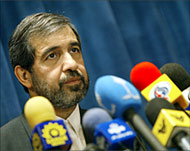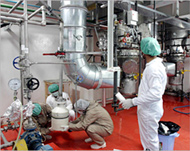Iran drops nuclear exemption demand
Iran has formally withdrawn its demand to exempt research and development of uranium enrichment technologies from a freeze of its enrichment programme, a Western diplomat said.

“The IAEA received a letter from Iran regarding the 20 centrifuges. It seems to cover all the elements and appears to be acceptable (to the EU),” the diplomat, who is close to the UN International Atomic Energy Agency (IAEA), told reporters on Sunday.
Earlier, France, Britain and Germany warned Iran that if it did not reach a final agreement to freeze parts of its atomic programme by Monday, they would not block UN Security Council moves to impose sanctions against Tehran.
The United States, which has been pressing for Iran’s case to be referred to the Security Council, accuses Tehran of wanting to build a nuclear bomb. Iran, though oil rich, says its programme is aimed solely at generating electricity.
Suspicions deepened
Washington has been pressing to refer Tehran to the Security Council, which has the power to impose sanctions. But the EU has so far favoured a softer approach.
 |
|
Hamid Reza Asefi: No reason yet |
Last week, Iran promised the EU it would halt all activities related to uranium enrichment – a process that can create atomic fuel for power plants or weapons – in return for a EU pledge to neutralise the threat of economic sanctions.
The ink on the hard-won accord was barely dry, however, when Tehran demanded an exemption for 20 enrichment centrifuges for research.
European diplomats said this was impossible and could only deepen suspicions that Tehran had a secret arms programme.
‘Not worried’
Iran on Sunday said the stand-off should be settled within the framework of the agency, but said being referred to the Security Council would not be “the end of the world”.
“We are not worried about going to the Security Council, because it is not the end of the world,” foreign ministry spokesman Hamid Reza Asefi told reporters.
“But we would prefer it be sorted out in the framework of the agency. There is no reason for it to go to the Security Council. We think the problems will be finally sorted out in the framework” of the International Atomic Energy Agency (IAEA), Asefi added.
On Friday, Western diplomats said Iranian negotiators had agreed to drop the demand, paving the way for a comprehensive deal with the EU on an International Atomic Energy Agency (IAEA) resolution that would make the voluntary freeze a binding commitment for Tehran.
But Iranian Foreign Minister Kamal Kharazi appeared to revive the centrifuge demand on Saturday, telling reporters in Tehran the deal with the EU did not ban research and development involving centrifuges – the equipment used to enrich uranium.
“What we want is not against our previous agreement, it is a matter of research and development for which there is no prohibition,” he said.
“We have submitted a letter to the IAEA informing them that we want to keep 20 centrifuge systems working. This would be under the supervision of the agency and is only used for helping research projects.”
 |
|
Iran maintains its programme is |
Demands
A European diplomat said Iran agreed to back down on the issue of the 20 centrifuges, but demanded in return the EU should cut a section out of the draft resolution calling for IAEA chief Muhammad al-Baradai to report to the IAEA board of governors if Tehran resumed any enrichment-related activity.
A Western diplomat said Iran also wanted language in the text guaranteeing Iran’s right to enrich uranium.
The Europeans want the freeze, once implemented, to be transformed into a termination of Tehran’s enrichment programme.
In exchange, the EU is prepared to offer Iran a package of political and economic incentives.